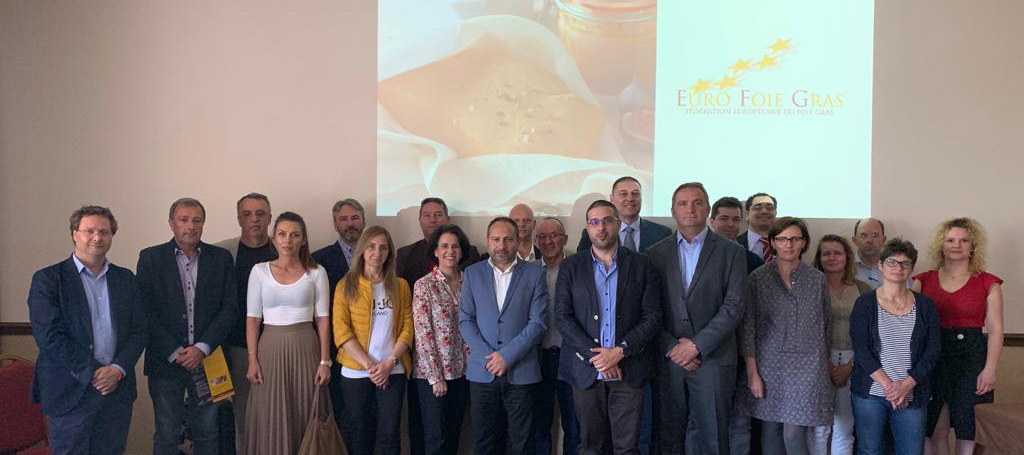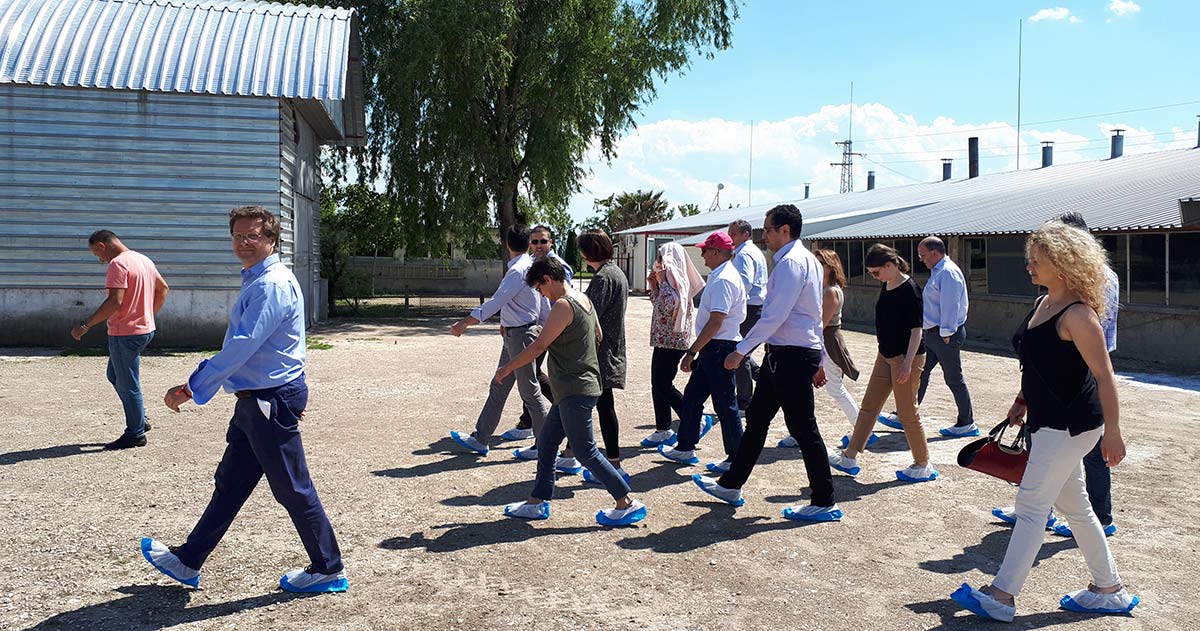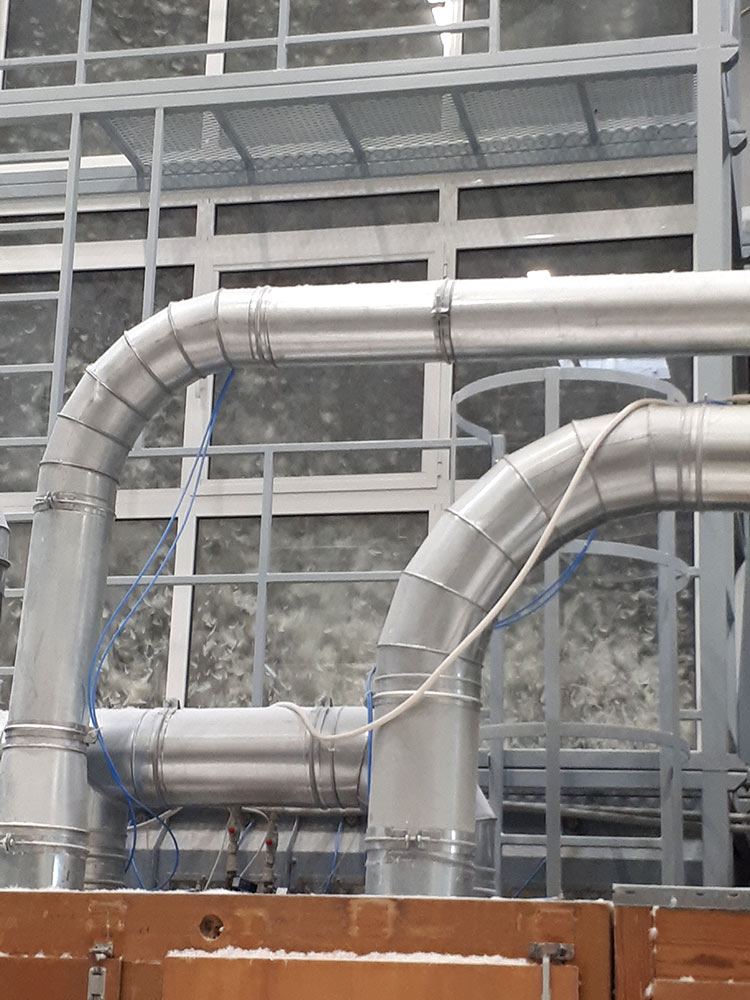European meeting on foie gras
Brussels, 20 February 2020
The 6th edition of the cocktail of the Circle of Foie Gras Friends was held on Tuesday, 18th of February in Brussels to celebrate this delicacy. Members of the European Parliament (MEPs), representatives of the European Commission, permanent representations of Member States, regional representations and stakeholders met at the Stanhope Hotel to discuss this product, ambassador of European gastronomy.
Following the European elections of 26 May 2019, the Circle of Foie Gras Friends is pleased to welcome ten MEPs from foie gras producing and consuming countries. The cocktail was an opportunity to induct them as members. The Circle is also delighted to count on the loyalty of several re-elected MEPs.
In his opening speech, Mr. Christophe Barrailh, President of Euro Foie Gras, stressed the importance of the European marketing standards for poultry meat for the European foie gras sector: “The future delegated act revising these standards must imperatively maintain the definition of minimum liver weights for the designation ‘foie gras’, and if possible, include a definition of ‘processed foie gras’ (…) in the interest of consumers and producers attached to a product of excellence”[1]. He also insisted on transparency, a value to which Euro Foie Gras is very attached, by offering farm visits to all interested guests.
Throughout the evening, the guests had the
pleasure of tasting several recipes created by Stanhope chef Laurent Gauze
based on foie gras, smoked duck breast and duck gizzard, in a festive and
friendly atmosphere.
[1] Find our commitments on our website.
Sullivan County finds New York foie gras ban unconstitutional
Voted on October 30 by the New York City Council, the ban on the sale of foie gras is expected to apply from 2022 onwards to all stores and restaurants in the city.
The European Foie Gras Federation – Euro Foie Gras – had strongly criticized this demagogic decision based on misconceptions [see our press release], but this ban, in addition to having no solid foundation, will also have disastrous consequences for rural activity in Sullivan County, New York.
Indeed, this is where the two largest foie gras farms in the United States are located, La Belle Farm and Hudson Valley Foie Gras. With 380 employees and while New York City is their largest market, these two producers and Sullivan County believe that the ban places an unreasonable restriction on their business – that is, outside of the jurisdiction of the municipality of New York – and officially filed a petition with the State on December 11 to have it declared unconstitutional. If their request is successful, New York City – where foie gras is on the menu of nearly 1,000 restaurants – will be forced to overturn its decision.
European livestock sector unites to ‘burst’ the myths surrounding the sector
Brussels, 10th December 2019 – Representatives from the European livestock sector gathered today in front of the European Commission buildings in Brussels to address the danger of oversimplifying the debate around livestock and its role in European society. This flash action echoes a number of concerns highlighted by the numerous protests that have taken place in different European countries in recent weeks.
Aiming to tackle the myths that prevail online today and the agri-bashing related to livestock production, the European Livestock Voice, a group of EU-based organisations that are active on livestock issues, decided to raise their voices at EU-level by bringing together farmers, MEPs and other actors from the sector to ‘burst’ a series of balloons carrying common myths or misinformation in front of the European Commission building. This action took place on the first day of the European Commission’s Agricultural Outlook conference and a few days after the new European Commission was appointed in order to try to rebalance the debate around livestock production.
Marianne Streel, President of the Wallonian Farmers Organisation, who was present during the flash action, said “We want to urge people and policy-makers to pay attention to the European livestock sector and to the misleading information that is damaging its reputation and endangering farmers’ livelihoods and even their lives in some cases. In Wallonia, farms shut up shop every day. In the last 10 years, 31% of our farms have disappeared. These are clear and frightening figures that can also be found in other Member States. If we lose our livestock farms, the repercussions will be significant in many areas, both in our countryside and on our plates. These consequences are currently overlooked in the debates because we tend to forget the positive aspects of livestock in Europe.”
In this regard, professionals from the sector are starting to mobilise to raise awareness throughout Europe, from Ireland to Italy, with initiatives that aim to make their point of view heard and remind decision-makers that the debate on these issues is also constantly evolving at academic level. The European Livestock Voice launched an initial campaign at EU level supported by a website with the aim to engage in the debate, focusing on facts and feedback from professionals in the sector. During the flash action, the organisers announced that the group will continue and expand these actions in the coming months.
Stop food dictatorship and harassment from activists!
Brussels, 15 November 2019 – Following our first press release (available here), Euro Foie Gras wishes to express its outrage at the new action of animal activists in a starred restaurant in the Limburg region offering three dishes based on foie gras.
In the restaurant, the activists asked to shut down Filip Callemeyn’s farm with signs and slogans. We want to recall that Mr Callemeyn is the only producer of foie gras in Flanders, a region where his activity was unfortunately banned from 2023 by a decision based on a lack of knowledge of the production and prejudices caused by false images and ideas shared by animal activists.
This attack against Mr. Callemeyn’s activity is scandalous. After the action on his farm and the occupation of an Antwerp supermarket selling his products last weekend, we call for the harassment of which Mr Callemeyn is victim to stop. This product is legally manufactured and marketed. Euro Foie Gras gives its full support to Filip and his family who are alone in dealing with these actions while their future is already uncertain because no compensation system has been proposed yet by the government.
Euro Foie Gras considers that a minority of people do not have to impose their food choices on the rest of the population, let alone by intimidation and violence. Euro Foie Gras also calls on the Minister to clearly condemn this type of behavior against Flemish farmers and breeders.
Euro Foie Gras, the European Federation of Foie Gras, brings together producers’ federations from France, Belgium, Bulgaria, Spain and Hungary. Its goal is to establish a continuous exchange of good practices, know-how and promote the profession of foie gras producer.
Freshly released NutriRECS consortium dietary advice updates on red and processed meats: a turning point in a longstanding controversy?
Opinion piece by Prof. Frédéric Leroy
Brussels, 16 October 2019 – Although we are surrounded by an overwhelming abundance and variety of foods, the simple daily act of eating remains a problematic struggle. In a highly normative society, we are continuously being reminded of our poor eating habits. The animal/plant divide in dietary preconceptions seems to be an important part of the mindset, suggesting a cultural rather than a factual perspective on eating right. Whilst the Western diet is clearly causing havoc and undermining public health, even the dietary guidelines usually put a disproportionate emphasis on the need to reduce the consumption of red meat and the products derived thereof. This is remarkable, to say the least, as red meat is a valuable nutrient-dense food and a key component of our evolutionary diets. It has been consumed since the origin of our genus, sometimes in formidable amounts. By 1.5 million years ago, we became largely adapted to meat eating, both anatomically and physiologically, and could not have survived without it.

This opinion piece is authored by Prof. Dr. ir. Frederic LEROY,
Vrije Universiteit Brussel
#MEATTHEFACTS: European Livestock Voice sets to balance the debate around livestock production
23/09/2019
Euro Foie Gras is proud to be a part of the European Livestock Voice initiative that was launched today in the European Parliament. Please find below the official press release for the event !
PRESS RELEASE
The livestock sector is today at the epicentre of public debates in Europe and beyond. These debates are now mainly dominated by interest groups who spread myths and radical views about livestock farming. Ever increasing on social media and in the press, these myths and opinions end up portraying a picture that is in stark contrast with the reality experienced and lived every day by thousands of European farmers and professionals on the ground. These debates have strong impacts on the views of European consumers on the role of animal products in their lifestyle choices and they push the livestock sector into an extremely defensive corner of society. This negatively affects the EU livestock farming model and policy framework, increasing the challenges faced by our farming communities to ensure their economic viability, generational renewal and their capacity to adapt to societal and environmental demands.
In this context, and for the first time at EU level, over a dozen livestock organisations have decided to come together to take joint action to elevate the “other side” of the story, necessary to restore balance and factual information on both the impact and the contribution of the European livestock sector. With this objective in mind, European Livestock Voice has developed its own information hub, an online portal reviewing the accuracy of the most frequently made statements about livestock production, consumption and its benefits:
NO – 1kg of beef does not require 15,000L of drinking water to be produced
YES – The average size for livestock farms in Europe is below 50 hectares and Europe remains a model of family farming
NO – Using land for animal feed does not necessarily compete with land for human food
YES – European farmers care for their animals as it is fully in their interest to do so.
We are convinced that the EU livestock farming model, based on diversified, local and family farm structures, is the backbone of the EU’s rural areas. It supports a great number of jobs and industries, it contributes to the circular approach within the EU bioeconomy, while also ensuring a steady and affordable supply for sufficient, safe and nutritious food, as well as many other products and by-products, needed for a healthy lifestyle or Europe’s cultural and creative industries.
Removing livestock farming from Europe – a “Livestock Exit” – would have severe consequences. Europe without livestock would lose essential pasture lands, face increased forest fires, lack greatly in organic fertilisers, green energy and many other essential raw materials while contributing to an increased rural exodus. At the same time, it would mean the need to rely on imports for animal products, with virtually no control over the production standards and increasing the demand for fossil fuel-based materials.
To support the launch of this initiative two newly appointed MEPs, also livestock farmers, Alexander Bernhuber (EPP, AT) and Jeremy Decerle (Renew Europe, FR) have decided to lead the debate in the new European Parliament by hosting the launch event of our platform today in Brussels.
For MEP Alexander Bernhuber the situation is clear “Today’s debate about livestock farming is often held on a lack of knowledge within the society. The gap between consumers and producers is getting bigger and bigger. European farmers produce at worldwide highest animal welfare standards. Nowadays the challenge is to communicate the essential work of our farmers via several channels to the consumer. European Livestock Voice created a significant platform to brighten this issue and fight against disinformation at European level. It is important to spread fact-based knowledge about today’s livestock farming within the media. Hence, I strongly support this initiative.”
On his side, MEP Jérémy Decerle commenting on the initiative said that “As a breeder of Charolais cows, but also as a Member of the European Parliament (COM AGRI), I can only welcome the launch of such a European platform, specifically dedicated to livestock farming. It could help to dispel some preconceived ideas about this profession and bring a little pragmatism into the debates. At a time when Europeans want to eat healthier and more local food, but also to better preserve their environment, farmers can be part of the solution rather than part of the problem, and the search for solutions begins with a comprehensive and rational look at the situation.“
MEP Clara Eugenia Aguilera García on her side commented “This initiative is a positive signal helping us in the European Parliament in our work to defend the EU livestock sector. The European livestock community works hard to ensure quality, sustainability and animal health and welfare. It has to be recognized while keeping a level playing field. Given the ever-increasing number of misconceptions, more work is needed to restore a constructive and rational discussion around a sector so important to our rural areas, our environment and our future.”
Discover the foie gras production in Wallonia on June 22 and 23!
Like every year, several foie gras farms will open their doors for the Open Farm Days which will take place on the 22nd and 23rd of June throughout Wallonia. Guided tours, discovery of the different production phases, discussion on the profession, tasting of good local products and fun activities will be on the program. Passionate breeders, who are proud of their know-how, will be happy to welcome you and answer your questions.
All information on: https://jfo.be/
More information about Walloon foie gras: https://www.facebook.com/FoieGrasWallon/
Euro Foie Gras shows off its ambitions in the light of EU elections
It was in Plovdiv, a city full of history, that the Euro Foie Gras General Assembly took place on May 20 and 21, 2019. Combining discovery of the region and important decisions for the European foie gras sector, this General Assembly was a success.
Euro Foie Gras members welcomed the record level reached in 2018 by foie gras exports from the 5 European producing countries to third countries. With a turnover of 82 million euros, European exports worldwide rose by 58% in value compared to 2018, especially to Japan. Another reason for satisfaction: in 10 years, Hungary has doubled its internal consumption and increased its exports to neighboring countries such as the Czech Republic, Slovakia and Serbia. The key figures of the sector are part of the information that can be found on the new Euro Foie Gras website. Interactive and modern, it gives information on all facets of the sector : waterfowl-based products, the different phases of production and also the numerous commitments of the Federation in terms of quality, health and animal welfare.
The General Assembly made important decisions for the sector. Euro Foie Gras members decided to collect and share forecast data for the production of fat palmipeds. This will be a very useful anticipation tool to help operators make decisions.
In addition, Euro Foie Gras members wish to work collectively, with the support of an independent research organization, on common animal welfare indicators and their regular monitoring. It may be recalled that Euro Foie Gras has had since 2011 a European Charter on breeding of waterfowl for foie gras, which sets out the commitments that must govern the production already subject to European legislation on animal welfare.
The General Assembly was punctuated by visits to a foie gras farm as well as a feather and down upgrading plant. « European voters will go to the polls in a few days. By making strong decisions in Plovdiv, the European Capital of Culture this year, we are participating in our own way in building the European Union », concluded Christophe Barrailh, President of Euro Foie Gras.



The Euro Foie Gras General Assembly will meet in the European Capital of Culture
A must for European gastronomy, foie gras will be perfectly represented in this magnificent Bulgarian city, which is recognized for its authenticity and cultural heritage. Bulgaria is currently the 2nd largest European producer of duck foie gras with 2800 tonnes produced in 2018.
The General Assembly will be the opportunity to gather friends of foie gras to review the past year and future perspectives on various topics: European elections, health and animal welfare, communication strategy etc. A visit of the city as well as a breeding will also be organized.
This attractive program will allow participants to meet for two days around the foie gras in a cultural and friendly place, in perfect harmony with the vision of Euro Foie Gras.
Stop misinformation on foie gras production
Since its creation in 2008, Euro Foie Gras has been proud to promote the profession of foie gras producer, foie gras being a star dish of the gastronomic heritage of our continent. The continuous exchange of experiences and know-how within the federation is and will remain of paramount importance for the sector, as well as the awareness raising of policy makers to the issues the sector deals with.
Euro Foie Gras has always encouraged constructive dialogue on production conditions, biosafety standards, quality criteria and any other subject of interest to the federation. Euro Foie Gras has also always been open to critics which are an integral part of the democratic debate.
Nevertheless, we must not confuse on the one hand, criticism and rational questioning with regard to an agricultural sector or any other economic activity, and, on the other hand, actions of misinformation based on false statements and truncated images. The digital age unfortunately generates a favorable environment for sensational publications from associations that cultivate a conflictual relationship with reality on the ground and often exploit the public’s lack of knowledge about the production of foie gras.
